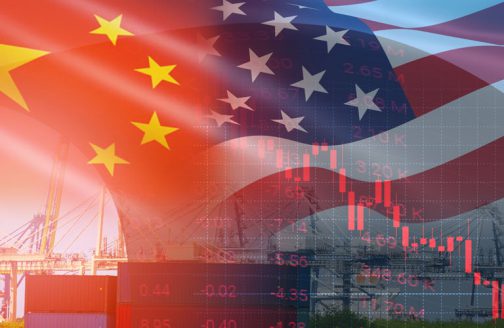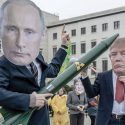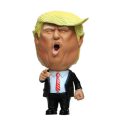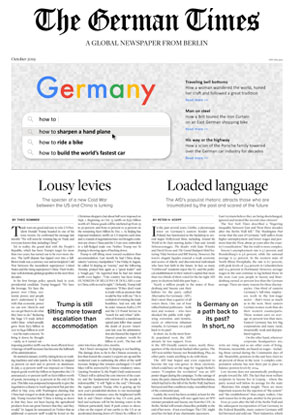The specter of a new Cold War between the US and China is lurking

Trade wars are good and easy to win, US President Donald Trump boasted in one of his toxic tweets. He confirmed his message last month: “We will soon be winning big on Trade and everyone knows that, including China!”
Yet in reality, the grand deal with the People’s Republic, which has been Trump’s target for more than two years, has turned out to be ever-more elusive. The tariff dispute has tipped over into a full-blown trade war, a currency war and an incipient Cold War between the incumbent superpower United States and the rising superpower China. Their rivalry may well dominate global geopolitics in the next three decades.
In his first foreign policy speech, back in 2016, presidential candidate Trump bragged: “We have the leverage. We have the power over China, economic power, and people don’t understand it. And with that economic power we can rein [them]in and we can get them to do what they have to do.” Reducing the huge US trade deficit with China – which actually grew from $375 billion in 2017 to $440 billion in 2018 – was his main concern. To bring it down, he thought – vainly, as it turned out – imposing punitive tariffs was the most efficient lever. A barrage of tariff increases has become the hallmark of his administration.
He started in January 2018 by raising levies on washing machines and solar panels. In March, he slapped 25 percent on steel and 10 percent on aluminum. In July, a 25-percent tariff was imposed on Chinese import goods worth $50 billion; in September, the US announced a 10-percent tariff on $200 billion worth of goods, increasing to 25 percent at the end of the year. This hike was postponed temporarily to give the negotiators a chance to reach agreement but put into effect in May 2019, with Washington claiming that China had reneged on deals already agreed upon. In July, Trump tweeted that “China is letting us down in that they have not been buying the agricultural products from our great Farmers that they said they would.” In August, he announced on Twitter that an additional 10-percent tariff would be levied on the “remaining $300 billion of goods.” Some of them were postponed in order to avoid harming American Christmas shoppers, but about half were imposed on Sept. 1. Beginning on Oct. 15, tariffs on $250 billion worth of Chinese goods will be ratcheted up from 25 to 30 percent, and from 10 percent to 15 percent on the remaining $300 billion by Dec. 1. As Beijing has imposed retaliatory tariffs on US imports each time and 12 rounds of negotiations have not brought a solution any closer, China and the US are now embroiled in a full-fledged trade war. Neither Trump nor Xi Jinping is showing signs of backing down.
Trump is still tilting more toward escalation than accommodation. Last month he had China designated a “currency manipulator.” One Friday in August, he called Xi Jinping an “enemy,” and the following Monday praised him again as a “great leader” and a “tough guy.” He regretted that he had not raised tariffs even higher. (“Our country has been losing HUNDREDS OF BILLIONS OF DOLLARS a year to China, with no end in sight.”) Defiantly, Trump told reporters: “If they don’t want to trade with us anymore that would be fine with me.” He is confident of winning the trade hostilities. And not only did he order Amazon, FedEx, UPS and the US Postal Service to “search for and refuse” deliveries of fentanyl, a murderous opioid pain killer that caused the death of 30,000 Americans last year, his administration also banned the import of Huawei products (worth $11 billion in 2018). The ban will enter into force after a few months.
But China’s strongman Xi Jinping is not buckling. The damage done so far to the Chinese economy is less than feared; the country’s exports are up and the weakened yuan is cushioning the effect of the tariff increase. Beijing’s line remains unchanged: US tariff hikes will be answered by Chinese retaliatory raises. Quoting President Xi, the People’s Daily underscored: “China’s will to defend the core interest of the country and the fundamental interest of the people is indestructible.” It will “fight to the end.” Obviously, the regime expects Trump, who is gearing up for next year’s presidential election, to run increasingly into domestic resistance once the heightened tariffs kick in and China’s refusal to buy US corn, pork, beef and soybeans will hit his farming voters in the Midwest particularly hard. If push comes to shove, a ban on the export of rare earths to the US or an accelerated drawing down of China’s $1.1 trillion US treasury holdings could dramatically boost the impact of China’s reprisals. Just a few weeks before the 70th anniversary of the PRC’s founding on Oct. 1 and only two years before the Chinese Communist Party celebrates its 100th birthday, Xi Jinping cannot show any sign of weakness. The nationalism he has fueled will stiffen his resolve not to bend to Trump’s quixotic policy.
Negotiations are scheduled to resume in October. But even if a mini-deal could be achieved, with China pledging to buy more American farm products and the US lifting its ban on Huawei, the fundamental confrontation between the antagonists would persist for the simple reason that the trade hostilities are not only about trade. Behind them lurks the specter of decoupling the two largest economies of the world – and behind that the scenario of another Cold War fraught with danger, this time pitting the United States against the People’s Republic of China in a geopolitical, geostrategic and ideological war over the shape of the world in the 21st century.
David Shambaugh, the American sinologist, has called the two powers “The Tangled Titans.” And tangled they are. For all practical purposes, their economies have been fused over the past few decades. Their supply chains are deeply enmeshed. Mutual investment reached many tens of billions before it fell sharply as the trade war intensified. America’s semiconductor industry is heavily exposed to China, while American consumers contributed significantly to Chinese growth. But now the hardliners in Washington are trying to disentangle the two titans. Decoupling seems to be the order the day in the White House: breaking up a relationship that is seen as posing a long-term strategic threat to the US and stopping China from modernizing its economy and achieving technological leadership.
And clearly the trade hawks have the ear of the president. In a fit of presidential megalomania, Trump tweeted on August 23: “Our great American companies are hereby ordered to immediately start looking for an alternative to China, including bringing your companies HOME and making your products in the United States.” If he were to follow through on this, the ensuing global disruption would entail grave uncertainties and perils.
For John Bolton, the president’s recently fired national security advisor, trade was but one facet of China’s threat to American national interests. He belongs to the school of thought that not only resents China’s aspiration to economic primacy but views China as an adversary seeking regional and global dominance. Bolton’s posture was that of a hardheaded realpolitiker, a stance already foreshadowed in the “National Security Strategy of the United States” published in December 2017. This fact, coupled with reports that Bolton had already lost the president’s ear, makes it unlikely that Bolton’s departure will have much effect on US policy toward China.
The document described China as a “revisionist power” seeking to replace the United States in the Indo-Pacific region and to “shape a world antithetical to US values and interests.” Pulling no punches, it argues: “Contrary to our hopes, China expanded its power at the expense of the sovereignty of others. China gathers and exploits data on an unrivaled scale and spreads features of its authoritarian system, including corruption and the use of surveillance. It is building the most capable and well-funded military in the world, after our own. […] China’s infrastructure investments and trade strategies reinforce its geopolitical aspirations. Its efforts to build and militarize outposts in the South China Sea endanger the free flow of trade, threaten the sovereignty of other nations, and undermine regional stability.”
In case anyone missed the point – that “a geopolitical competition between free and repressive visions of world order is taking place in the Indo-Pacific region” and that China and the US are headed for confrontation – US Vice President Mike Pence, rattling off a comprehensive list of China’s unacceptable policies, said in a speech at the Hudson Institute: “This president will not back down… America will stay the course.”
As it stands, the world does not know where this course will take us. According to Graham Allison, the founding dean of Harvard’s School of Government, armed conflict is possible. In his essay “The Thucydides Trap,” he asks: “Are the US and China headed for War?” Writing about the conflict that devastated Athens and Sparta 2,500 years ago, he concludes: “When a rising power threatens to displace a ruling power, alarm bells should sound: danger ahead.” He has since expanded his thesis into a book titled – with an echo of President Trump’s erstwhile advisor Steve Bannon – Destined for war. Some retired Chinese generals also make equally belligerent comments. “If the Bannons of this world are determined to stop China’s rise, they will likely push China and America into a military showdown,” wrote the Global Times.
Europe, while not sharing Trump’s protectionist leanings and his trade war strategy, also wants a level playing field, reciprocity of market access and equal investment opportunities in the People’s Republic. It banks on cooperation, however, not on extortionist confrontation. It will assert its interests, but above all it will want to influence the United States and China not to turn “a manageable, albeit vexed, relationship into an all-embracing conflict,” in the words of Martin Wolf. The highly respected Financial Times commentator pointedly added: “for no good reason.”
Theo Sommer
is Executive Editor of The German Times.




